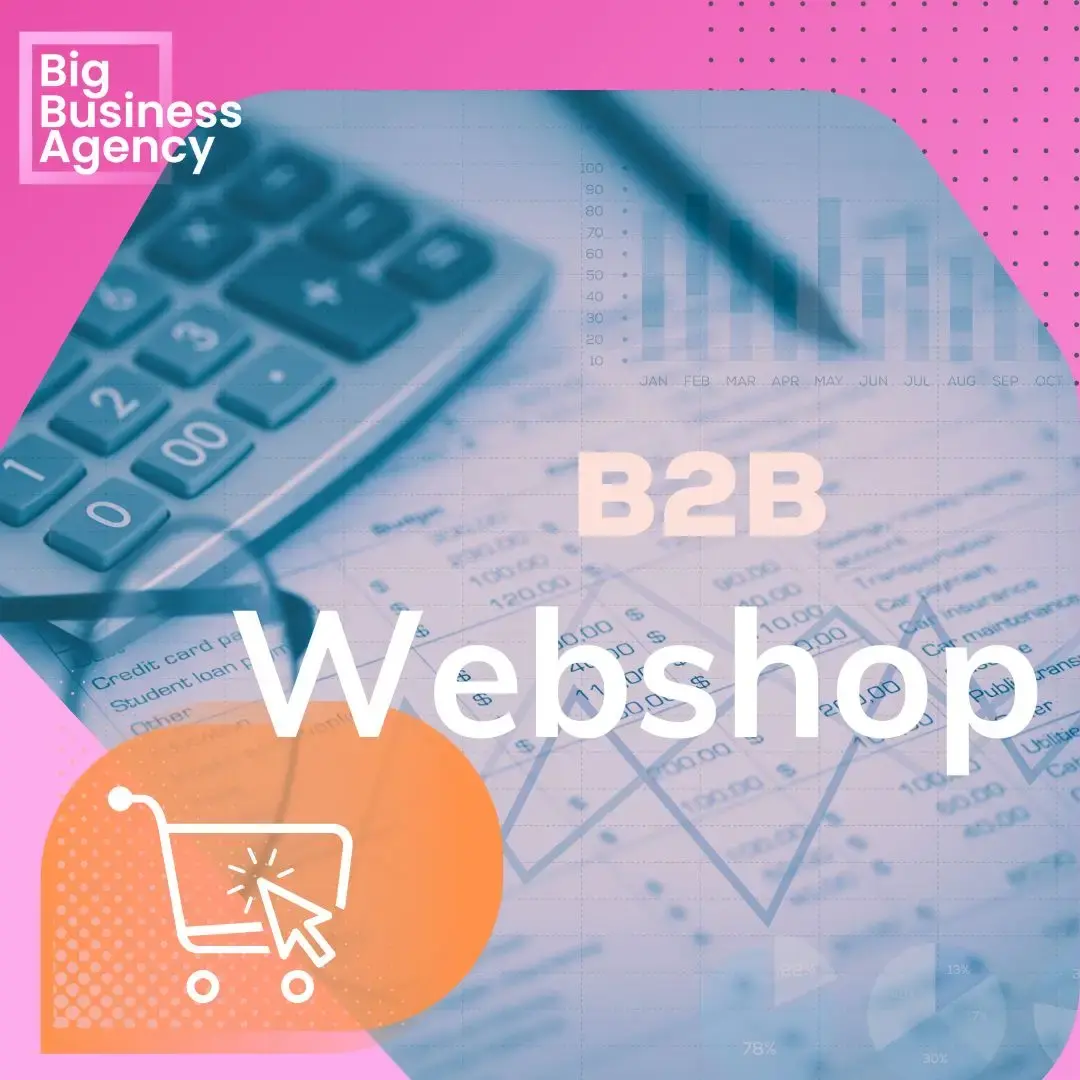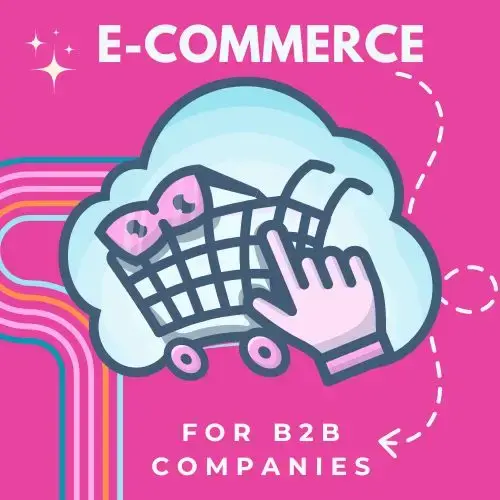2 min read
Why your B2B company needs a webshop
"Online" has become the new normal, fundamentally transforming how we buy and sell. Unsurprisingly, eCommerce is growing so quickly in the B2B...

As B2B buyers continue to evolve integrated B2B eCommerce continues to be vital. In fact, the global B2B eCommerce market is projected to reach $20.9 trillion by 2027, according to a report by Statista. This dramatic growth highlights the importance of adapting to online platforms to remain competitive.
Table of Contents
tune in now to hear how eCommerce can eliminate barriers to growth in your business
With more companies leveraging eCommerce solutions to streamline operations, enhance customer experiences, and expand their market reach, understanding the nuances of B2B eCommerce is essential for any business aiming for success.
It may surprise you to know the B2B eCommerce market is valued at almost 6 times the value of the B2C market.

B2B eCommerce (Business-to-Business eCommerce) refers to the online sale of goods and services between businesses. Unlike B2C (Business-to-Consumer) eCommerce, which focuses on individual consumers, B2B transactions involve companies selling products and services to other companies.
B2B eCommerce platforms must accommodate complex buyer structures and purchasing rules, incorporating sophisticated service catalogues, pricing, and contractual entitlements. Customer-specific pricing with negotiated discounts, advanced search functionalities for the availability of complex SKU and Service combinations, and support for complex approval processes and decision-making are just some of the advanced functions B2B eCommerce solutions provide.
The goal is to provide a seamless and efficient purchasing experience to deliver on the customer promise through an outstanding Customer Experience.

Offering integrated B2B eCommerce to your customers offers numerous advantages, including:

B2B eCommerce encompasses various models, each catering to different market dynamics.
These include:
B2B refers to companies selling products directly to other businesses, eliminating intermediaries. This model often involves customised service catalogues, price books, product and service bundles, and advanced workflows incorporating warehouse and field service operations.
Manufacturers leverage B2B eCommerce to sell their products directly to retailers or wholesalers, streamlining the supply chain and reducing costs associated with traditional distribution.
This model involves businesses selling to other businesses that, in turn, sell to consumers. It allows for a broader reach and facilitates the distribution of products through multiple channels.
Procurement platforms enable businesses to manage their purchasing processes more effectively. They provide tools for suppliers to showcase their offerings, simplifying the buying process for professional buyers.
e-Procurement refers to the digital management of purchasing processes, from requisition to payment. This system enhances efficiency, reduces errors, and facilitates better supplier relationships.
Wholesale businesses use B2B eCommerce to sell products in bulk to retailers or other businesses. This model often features volume pricing and streamlined order processes.
Online marketplaces combine multiple sellers and buyers in one platform, providing diverse products and services. They enable businesses to reach a larger audience, benefiting from established trust and credibility.

B2B eCommerce businesses typically progress through several key stages:
Effective marketing strategies are crucial for B2B eCommerce success. Some key approaches include:
This strategic marketing approach focuses on targeting specific high-value accounts with personalised campaigns. Instead of casting a wide net to attract potential clients,
Account Based Marketing (ABM) zeros in on businesses most likely to benefit from your products or services. Companies can create more meaningful interactions and build stronger relationships by tailoring marketing efforts to these select accounts' unique needs and pain points.
ABM typically involves collaboration between sales and marketing teams to ensure that messaging and outreach are aligned, leading to a more cohesive customer experience. This approach increases the chances of converting the type of account you want to work with and enhances customer loyalty by demonstrating a deep understanding of the client's business challenges and objectives.
Don't count the companies you reach - reach the companies that count
Developing and distributing valuable, relevant, and consistent content that directly addresses the industry's various challenges and pain points is essential in establishing authority and credibility.
By offering insightful articles, whitepapers, case studies, and other forms of content, businesses can position themselves as thought leaders in their fields. This approach helps build trust with potential clients and enhances engagement by providing solutions to their specific problems.
By consistently delivering high-quality content that educates and informs, businesses can cultivate long-term relationships with their audience, ultimately driving brand loyalty and encouraging clients to choose their products or services over competitors.
Search Engine Optimisation is a critical digital marketing strategy that enhances your website's various elements to improve its visibility in search engine results. By optimising website content, including keywords, metadata, and site structure, businesses can ensure that their web pages rank higher in search engine results pages (SERPs).
This increased visibility is crucial as it helps attract more targeted traffic to the website, consisting of users actively searching for the products or services you offer.
Effective SEO strategies involve thorough keyword research to understand what potential customers are searching for, creating high-quality content that answers their queries and continuously monitoring and adjusting tactics to align with changing search engine algorithms.
Businesses can drive organic traffic, enhance user engagement, and ultimately increase conversions and sales by focusing on on-page and off-page SEO techniques.
Email marketing is a powerful tool that allows businesses to connect personally with potential and existing customers. By crafting targeted email campaigns, companies can strategically nurture leads and guide them through the sales funnel with relevant, timely information.
These campaigns are tailored to address the recipients' specific interests and needs, increasing engagement and conversion rates. Moreover, email marketing is a vital communication channel for informing existing customers about new products, services, technical updates, and promotions your business offers.
Regular newsletters, personalised offers, and product announcements delivered directly to your customers' inboxes help maintain strong relationships and foster customer loyalty.
By leveraging data analytics, businesses can track the effectiveness of their email campaigns. This allows for continuous improvement and ensures that the messaging resonates with the audience, ultimately driving growth and success in the competitive B2B landscape.
Engaging with audiences on platforms like LinkedIn Facebook, Instagram, Tik Tok and X (formerly Twitter) can significantly enhance brand awareness and facilitate valuable networking opportunities. By actively participating in industry discussions, sharing insightful content, and interacting with potential and existing customers, businesses can establish themselves as thought leaders.
LinkedIn, in particular, is a powerful tool for B2B marketing due to its professional focus. It allows companies to connect directly with decision-makers and influencers.
Through targeted campaigns and regular postings, brands can showcase their expertise, promote their products or services, and foster relationships that could lead to partnerships or sales.
Additionally, social media analytics provide businesses with valuable insights into audience engagement and preferences, enabling them to refine their strategies and effectively reach their target market.
As the eCommerce landscape evolves, several trends are shaping the future of B2B transactions:
The B2B eCommerce market in Europe will reach USD $1.8 trillion this year (2025).
Forrester estimates that by 2027 US B2B eCommerce will reach $3trillion and account for approx 24% of all US B2B sales
Implementing eCommerce has increased wholesale/supplier revenue globally by an average 49%
The compelling eCommerce statistic indicates that 89% of B2B buyers are swayed by the insights gleaned from their online research.
Numerous companies exemplify successful B2B eCommerce practices, such as:
Successfully setting up these essential B2B eCommerce web stores requires connecting the firm's delivery mechanism to the Web Store. While launching an eCommerce platform for professional buyers isn't as straightforward as consumer-focused plug-and-play web stores, adopting an integrated approach to eCommerce can significantly reduce time, costs and complications.
Integrated B2B eCommerce reflects the firm's ability to deliver to B2B buyers in real time- be it stock, solutions, training, or consulting. Examples include:
This capability is achieved by integrating the web store directly to ERP and field service systems. In fact, integrated eCommerce software is often partially embedded within your ERP. This integration has become far easier to achieve using proven platforms like Commercient.
Given the ongoing diversification of the IT landscape, your ERP is not the only system you can use to enrich your web store’s online product/service catalogue. Operational delivery systems like field service operations, Maintenance Management Systems, and Asset Management Systems can all be integrated to provide automated operations driven from within your customer portal.
How do you measure the effectiveness of your B2B online shopping cart platform? While online revenue is a valuable gauge, you can monitor several other key performance indicators (KPIs) to ensure you’re heading in the right direction.
Selecting the right B2B eCommerce solution is crucial for long-term success. Consider the following factors:
By understanding the intricacies of B2B eCommerce and implementing cutting-edge solutions, businesses can transform their operations, enhance customer experiences, and unlock new growth opportunities.
B2B eCommerce enhances Customer Experience and is a game-changer for businesses looking to differentiate their premium offerings. In addition, it streamlines operations and unifies sales and after-market departments into a seamless flow.
Whether you’re a premium manufacturer, a wholesaler, or a service provider, there’s a B2B eCommerce solution tailored to your needs. Embrace the digital shift, and watch your business transform into a powerhouse of growth and innovation!
Check out this short video from CommercePro, our eCommerce Partner
B2B eCommerce involves more sophisticated transactions between companies, including sophisticated Service catalogues, centralised procurement billing options, price books and volume discounts, pre-payment and warehousing options, and streamlined returns policies.
B2C eCommerce focuses on sales between businesses and individual consumers.
B2B Buyers' expectations are evolving, and B2B eCommerce platforms enhance customer experience by providing convenient self-service options, tailored experiences, and easy access to customer support.
Some historically popular B2B eCommerce platforms include Shopify Plus, WooCommerce and BigCommerce, each offering unique features tailored for business needs. These work well with Salesforce and Wordpress.
For Premium Suppliers needing to differentiate through outstanding customer experience, CommercePro is an excellent, fully integrated B2B eCommerce Web Store hosted in the HubSpot Customer's Portal. We implement CommercePro and integrate it with ERPs and Field Service systems using Commercient's APIs.
Top 5 tips and strategies to boost your B2B eCommerce sales:
• Offer self-service: let B2B buyers take charge of their purchasing journey.
• Utilise B2B content marketing techniques: Content optimised for search engines and strategic social media marketing will boost visibility and motivate potential buyers to complete a purchase.
• Incentivise purchases: offer a free trial, a reduced shipping rate, or a money-back guarantee.
• Increase customer reviews: 92% of B2B buyers are more inclined to buy after reading a reliable review.
• Run retargeting ads: capture more sales by retargeting promotions and offers based on user demographics and site interactions.
• Participate actively on social media: Foster connections and attract potential clients by engaging in industry discussions and distributing insightful content on networks such as LinkedIn and Twitter.
Ready to Transform Your Business? - Contact us today for a free consultation on B2B eCommerce solutions tailored to your needs!
Elevating Customer Service: Unlocking the Secrets to Top Quality Service
Streamline your quote to cash with automation
Overview of an eCommerce Agency
B2B eCommerce Platforms: Is your solution holding you back?
What are the top internal barriers to growth?
Gartner: the future of B2B Sales
Using POV to win large Enterprise deals
Mastering a Self Source Pipeline


2 min read
"Online" has become the new normal, fundamentally transforming how we buy and sell. Unsurprisingly, eCommerce is growing so quickly in the B2B...

Nearly 90% of B2B buyers use digital channels as their primary method of identifying and evaluating new suppliers, highlighting the growing reliance...

Digitising B2B contracted customers with an easy-to-use integrated eCommerce CRM can transform your business with simplified operations. Imagine one...